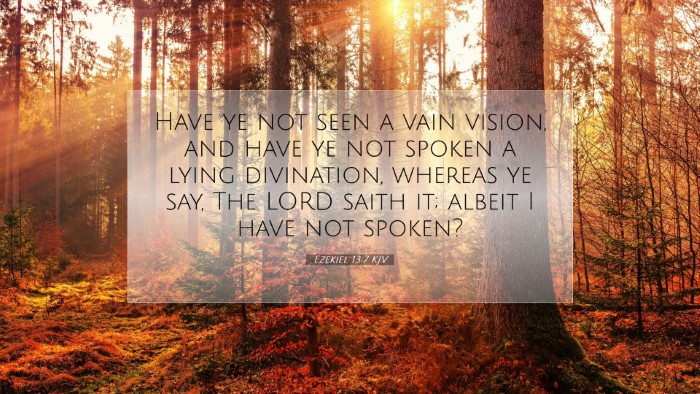Ezekiel 13:7 - A Commentary
Bible Verse: "Have ye not seen a vain vision, and have ye not spoken a lying divination, whereas ye say, The Lord saith it; albeit I have not spoken?" (Ezekiel 13:7, KJV)
Introduction
The verse Ezekiel 13:7 stands as a critical declaration against false prophets and their misleading prophecies. Within its context, this passage is part of a broader message from God through the prophet Ezekiel about accountability, truth, and the dire consequences of leading His people astray. This commentary aims to explore the insights of various public domain theologians, including Matthew Henry, Albert Barnes, and Adam Clarke, providing a comprehensive understanding of this verse's significance.
Contextual Background
The prophet Ezekiel delivers this message during the Babylonian exile, a time when the people of Israel were vulnerable and desperate for hope. The false prophets emerged during this crisis, offering empty promises and misguided assurance of peace and safety, which was contrary to God’s true message of judgment and repentance. Understanding this backdrop is essential in grasping the weight of Ezekiel 13:7.
Commentary Insights
-
Matthew Henry's Perspective:
Henry emphasizes the weight of responsibility borne by those who claim to speak on behalf of God. He interprets the phrase "have ye not spoken a lying divination?" as an admonition against the deception propagated by self-proclaimed prophets. According to Henry, such pretenders are not only undermining the authority of God’s word but also leading the people into spiritual peril. He further notes that true prophecy must align with God's revealed will, and anything less is ultimately vain and fruitless.
-
Albert Barnes' Analysis:
Barnes approaches this verse with a focus on the contrast between God's word and human conjecture. He asserts that false prophecies, which claim divine endorsement without divine knowledge, are morally reprehensible. Barnes points out that the phrase "the Lord saith it" is frequently misused, demonstrating the gravity of misrepresenting God’s intentions. He highlights that the God's silence in judgment is not absence but a call for repentance and genuine faith from His people.
-
Adam Clarke's Interpretation:
Clarke elaborates on the implications of false visions and dreams that lacked divine origin. He reflects on the detrimental effects such false prophecies can have on the community, leading them away from the truth and into a false sense of security. Clarke also stresses the importance of discernment among believers, urging them not to accept every prophetic word as truth without scrutinizing it against Scripture. He articulates that genuine prophets must demonstrate clear accordance with the Scriptures and the character of God.
Theological Implications
The theological implications of Ezekiel 13:7 extend beyond the ancient context of Jerusalem and resonate with contemporary issues within the Church. The nature of revelation, the expectation of prophetic accuracy, and the importance of discernment remain pressing topics in modern theology. This verse serves as a sobering reminder that not all who claim to speak for God are indeed speaking the truth. It underscores the responsibility of both leaders and laypersons to seek the genuine voice of God through prayer, study, and community discernment.
Application for Today
As we reflect on Ezekiel 13:7, it becomes crucial for both pastors and congregants to embrace the challenge of discernment in their spiritual walk. Here are some practical applications:
- Cultivating Discernment: Encourage unwavering engagement with the Scriptures. Leaders should provide teaching that aligns with biblical truth.
- Accountability in Ministry: Establish systems of accountability among those in leadership to ensure that prophetic claims are substantiated by Scripture.
- Community Engagement: Foster a community of believers who support one another in seeking God’s truth together, rather than individuals wandering into personal interpretations that may lead to error.
- Prayerful Reflection: Emphasize the necessity of prayer in seeking God’s guidance and wisdom in all matters—personal and communal.
Conclusion
Ezekiel 13:7 acts as a timeless warning against the perils of false prophecy and the significance of remaining faithful to God’s true message. The insights from Matthew Henry, Albert Barnes, and Adam Clarke collectively affirm the importance of discerning God’s voice amid a sea of conflicting messages. By adhering to these teachings, contemporary believers can uphold the integrity of their faith, ensuring that they speak and live out the truth of God’s word in a world yearning for authentic guidance.


